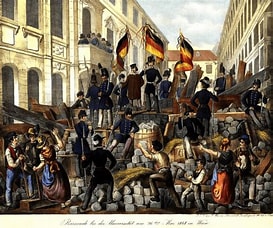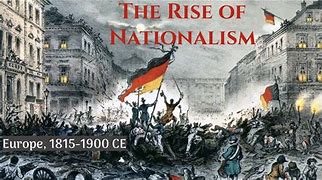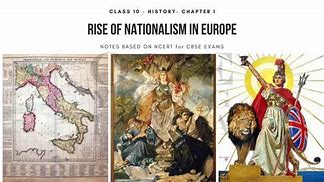Introduction
Imagine a world where people began to identify themselves not just by their local communities or monarchies, but by a shared sense of nationhood, language, and culture. This was the 19th century, a time when nationalism emerged as a powerful force, reshaping the political, social, and cultural landscapes of Europe and beyond. In this article, we will explore the rise of nationalism, its key drivers, and its profound impacts on history.
What is Nationalism?
Definition and Core Principles
Nationalism is the belief that a nation should have the right to govern itself and that the interests of the nation should be paramount. It emphasizes shared identity, culture, language, and often a common history. Nationalism can be both a unifying force and a divisive one, depending on how it is manifested.

Historical Context: The Late 18th and Early 19th Centuries
The French Revolution and Its Legacy
The French Revolution of 1789 was a pivotal event that laid the groundwork for modern nationalism. The Revolution’s emphasis on liberty, equality, and fraternity inspired similar movements across Europe. The idea that people had the right to self-governance and that national identity was a powerful force began to spread.
The Napoleonic Wars
Napoleon Bonaparte’s conquests and the subsequent reorganization of Europe further fueled nationalist sentiments. As Napoleon’s armies spread across the continent, they brought with them the ideas of the French Revolution, awakening national consciousness in various regions.
Key Drivers of Nationalism
Economic Factors
Economic changes, such as the Industrial Revolution, played a significant role in the rise of nationalism. As industries grew, so did the need for unified markets and policies, leading to increased calls for national unity and self-governance.
Cultural and Linguistic Identity
The 19th century saw a resurgence in cultural and linguistic nationalism. Movements emerged to promote and protect local languages, folklore, and traditions. This cultural revival helped to solidify national identities and differentiate one nation from another.
Political and Intellectual Movements
Intellectuals and politicians like Giuseppe Mazzini, Otto von Bismarck, and Woodrow Wilson were instrumental in promoting nationalist ideologies. Their writings and actions inspired and mobilized people to demand national independence and unity.

Nationalism in Europe
Italian Unification
The unification of Italy, led by figures like Giuseppe Garibaldi and Victor Emmanuel II, is a classic example of nationalist movement. The Italian people, fragmented into various states, came together to form a single nation-state, driven by a shared sense of Italian identity.
German Unification
Under the leadership of Otto von Bismarck, Germany was unified through a series of military victories and diplomatic maneuvers. The creation of the German Empire in 1871 marked the culmination of German nationalism.
Balkan Nationalism
In the Balkans, nationalist movements led to the breakup of the Ottoman Empire and the formation of new nation-states such as Serbia, Bulgaria, and Greece. These movements were often marked by conflict and ethnic tensions.
Impact on International Relations
Rise of Imperialism
Nationalism contributed to the rise of imperialism in the late 19th century. European powers, driven by nationalist ambitions, competed for colonies and resources around the world. This competition often led to conflicts and the redrawing of global maps.

World War I
The complex system of alliances and nationalist tensions in Europe ultimately led to the outbreak of World War I. The war was fought on a massive scale, involving many of the world’s great powers and resulting in unprecedented human suffering.
Social and Cultural Impacts
Education and Media
Nationalist movements often emphasized the importance of education and media in promoting national identity. Schools and newspapers played crucial roles in disseminating nationalist ideologies and fostering a sense of shared culture.
Art and Literature
Art and literature were also influenced by nationalist sentiments. Writers and artists began to explore themes related to national identity, history, and culture, further solidifying these concepts in the public imagination.
Criticisms and Challenges
Ethnic and Religious Tensions
Nationalism can exacerbate ethnic and religious tensions, particularly in regions with diverse populations. The emphasis on a single national identity can lead to the marginalization of minority groups.
Aggressive Nationalism
Aggressive forms of nationalism can lead to militarism and expansionism, as seen in the lead-up to World War I. This type of nationalism prioritizes the interests of one’s own nation over international cooperation and peace.
Case Studies: Successful Nationalist Movements
The Hungarian Revolution of 1848
The Hungarian Revolution of 1848 was a significant nationalist movement that sought independence from the Habsburg Empire. Although it was ultimately suppressed, it laid the groundwork for future nationalist movements in the region.
The Irish Nationalist Movement
The Irish nationalist movement, which spanned several centuries, culminated in the establishment of the Irish Free State in 1922. This movement was driven by a strong sense of Irish identity and a desire for self-governance.
Future of Nationalism
Contemporary Nationalism
In the 21st century, nationalism continues to be a powerful force. Modern nationalist movements often intersect with issues like immigration, economic policy, and global governance. The rise of populist leaders in various countries has reignited debates about the role of nationalism in contemporary politics.
Globalization and Nationalism
The tension between globalization and nationalism is a pressing issue. While globalization promotes international cooperation and economic interdependence, nationalist movements often advocate for protectionism and sovereignty.
Conclusion
The rise of nationalism in the 19th century was a transformative event that reshaped the world. From the unification of Italy and Germany to the complex web of alliances that led to World War I, nationalism has left an indelible mark on history. As we navigate the complexities of the modern world, understanding the roots and implications of nationalism is more crucial than ever.
Meta Description
Explore the rise of nationalism in the 19th century, its key drivers, and its profound impacts on history. Learn how nationalist movements shaped Europe and beyond, and what this means for contemporary politics.
FAQs
What were the main drivers of nationalism in the 19th century?
The main drivers included economic factors such as the Industrial Revolution, cultural and linguistic identity movements, and political and intellectual movements led by figures like Mazzini and Bismarck.
How did nationalism impact international relations in the 19th century?
Nationalism contributed to the rise of imperialism and the complex system of alliances that ultimately led to World War I. It also led to the redrawing of global maps as European powers competed for colonies and resources.
What were some of the social and cultural impacts of nationalism?
Nationalism emphasized the importance of education and media in promoting national identity. It also influenced art and literature, with writers and artists exploring themes related to national identity, history, and culture.
Can nationalism be both a unifying and a divisive force?
Yes, nationalism can be both unifying and divisive. It can bring people together under a shared sense of identity but also exacerbate ethnic and religious tensions, particularly in regions with diverse populations.
How does nationalism intersect with contemporary issues like globalization?
The tension between globalization and nationalism is a pressing issue. Nationalist movements often advocate for protectionism and sovereignty, while globalization promotes international cooperation and economic interdependence.


